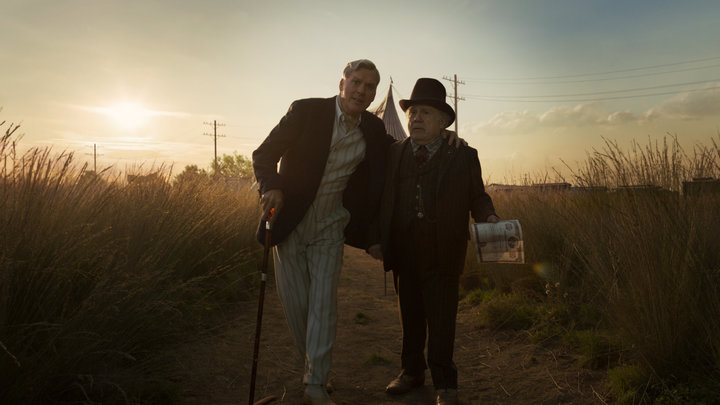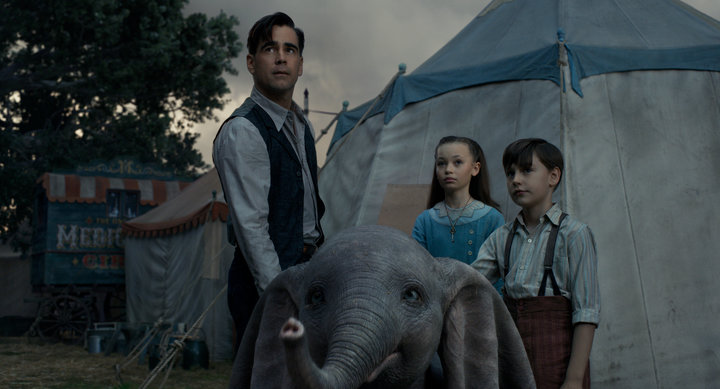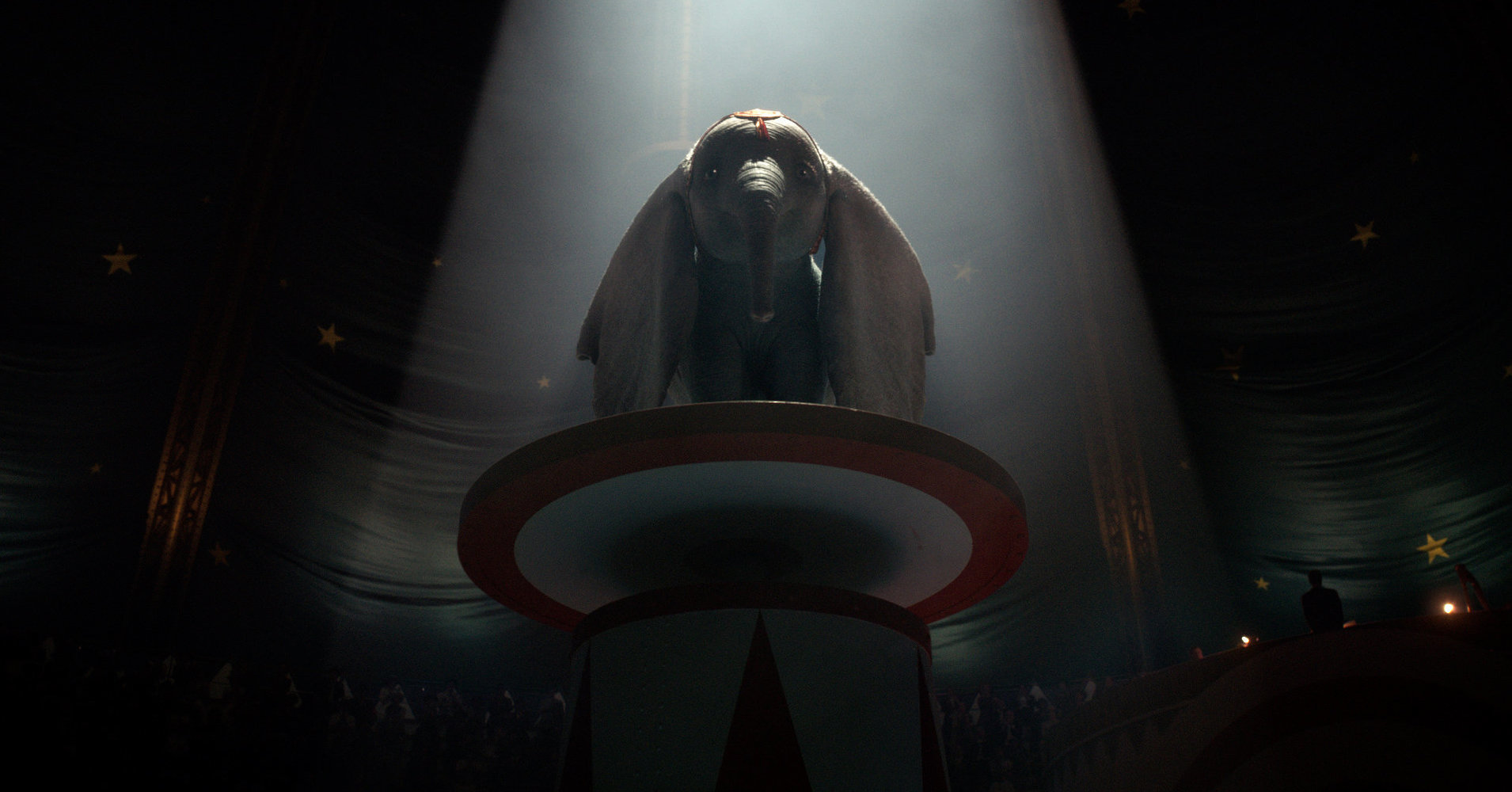[ad_1]
About midway through the latest shadow of Tim Burton’s former self ― you know it better as “Dumbo” ― the lifeless proceedings perk up for a minute, offering a glimpse of what the movie could have been. A scene set under the big top, where the titular baby pachyderm is poised to become the main attraction, finds circus performers conjuring large elephant-shaped bubbles that glide through the darkened tent like something out of a dream. Every particle shimmers in hypnotic purple. An acid hit, brief but potent.
The moment is inconsequential. Its psychedelia bears little resemblance to the hypersaturated hues and dull developments that monopolize “Dumbo.” But it provides a window into the trippy potential of Disney’s latest live-action reboot, yet another property in which Burton squanders his outré charisma for a phoned-in bummer.
How desperately I wish I wasn’t typing these words. There was once a time when I would have swung from any trapeze with Burton’s name on it. Now it’s getting harder and harder to spot the wunderkind who gave us “Beetlejuice,” “Edward Scissorhands,” “Batman,” “Ed Wood” and “Sleepy Hollow” ― pop-goth dreamscapes so distinct that “Burtonesque” became an adjective. Over the last decade or so, the director’s singularity has receded. His movies feel like gaudy imitations of his greatest hits, retreading the same themes with less ingenuity and even less pizzazz.
Then again, saying “Dumbo” has themes is a stretch. Does it even have a plot? Not one worth investing in. The 1941 animated original, based on a children’s story by Helen Aberson, ran a mere 64 minutes. This one clocks in at more than two hours. Surely something fills the time, right? It’s not racist crows, as none of the animals talk. Nor is it the drunken buddy comedy that inspired the aforementioned purple fantasia; there’s no Timothy Q. Mouse to guide a newly motherless Dumbo through his travails. No, this rendition is largely about humans, which might explain its brainlessness.

Here’s the meat, insofar as there is any: “Dumbo,” set in 1919, focuses on a traveling circus whose ringmaster, Max Medici (Burton rep player Danny DeVito), is attempting to salvage the cash-strapped operation. Max hires widowed combat veteran Holt Farrier (Colin Farrell) to care for an elephant that gives birth to wide-eyed Dumbo, mocked for his gigantic ears. Dumbo’s mother, Miss Jumbo, is sold off at half price because the world is cruel and Max needs some income. But it turns out Dumbo can fly, and he soon becomes the circus’ showstopper, enticing a greedy amusement park owner (Michael Keaton) seeking to acquire Max’s enterprise so he can exploit the little guy’s headline-making skills.
That’s a lengthy synopsis for a movie in which nothing much seems to happen. The second half blends two undercooked threads: Holt’s children (Nico Parker and Finley Hobbins) working to reunite Dumbo with his mama, and the big corporate baddie taking advantage of the indie circus he’s lured inside his lavish gates. Both are lacking in wonderment.
We also never get to feel much of anything for Dumbo and his fellow thespians beyond surface-level emotions. (Burton should have taken cues from the interspecies bond at the center of David Lowery’s “Pete’s Dragon,” or even from his own catalog. Zero, the expressive ghost-dog from “The Nightmare Before Christmas,” would do.) In fact, all of the characters might as well be stick figures. And with the exception of a quick Busby Berkeley-esque roundelay heavy on pinks and blues, Burton’s aesthetic signatures are reduced to what mostly looks like an overexposed CGI inundation.
The resulting question is less “What’s wrong with ‘Dumbo’?” and more “What happened to Tim Burton?” Across his 41-year career, he’s become a slave to his own style. With the help of nine-figure budgets, what was once ironic kitsch has ballooned into garish pablum.
The qualities that heightened Burton’s early reveries ― super-crisp colors, surreal expressionism (so many crooked trees and oversized eyes!), heroic outcasts, stark contrasts between light and dark, a preoccupation with death and otherworldliness ― now represent his downfall. The themes stayed the same, but the performances got sillier and the aesthetics more computerized and artificial-seeming. Just look at 2005’s “Charlie and the Chocolate Factory” (made for $150 million) or 2010′s “Alice in Wonderland” ($200 million), which both amount to live-action cartoons. When the latter grossed a mind-melting $1 billion worldwide, something must have gone to Burton’s head. And that something is now on display in “Dumbo.”

In a way, the movie is a metaphor for Burton’s career: The upstart oddball gets seduced by big business, not realizing that infinite resources will limit his vision instead of further it. Does he stay humble or give in to the flashy machinery calling his name?
Apparently, it’s the latter. “Dumbo” lets Burton stage a chaotic third act full of burning buildings and life-threatening feats, but the actors barely wake up, which works against the enchanted bombast of Danny Elfman’s score. People in Hollywood clearly love working with Burton, yet few submit inspired work on his sets anymore. Then again, they aren’t given particularly great scripts. “Dumbo” is credited to Ehren Kruger, a genre journeyman who’s done one or two good things (“The Ring”) and a lot of not-so-good things (three “Transformers” installments, “Ghost in the Shell”). Keaton, of all people, should be able to recapture his hammy “Beetlejuice” dedication, but instead, he sleepwalks through the movie, as bored by the green screens as we are by the pastel overkill.
When was the last time Burton achieved actual whimsy ― the good kind? Probably “Big Fish,” his lovable quirk-fest from 2003. As he aged, his films failed to mature. Often, they did the opposite. As stories, “Planet of the Apes,” “Alice in Wonderland,” “Charlie and the Chocolate Factory,” “Sweeney Todd,” “Dark Shadows” and “Dumbo” are Western classics that seem tailor-made for Burton, with their outsider protagonists and freak-show affectations. Instead, they wind up feeling plastic. By the end of the latest one, I hardly cared about that jug-eared elephant or anyone else around him.
It’s easy to sneer at the material studios are churning out these days, but this isn’t baldfaced cynicism. I wanted so badly to care. I’ll try again when Burton ascends whatever trapeze he has in store next. (Will those “Beetlejuice 2” rumors finally pay out?) Somewhere, deep inside, the old Tim Burton exists ― the one who didn’t get swallowed up by the pallet he himself designed, the one who still loves hallucinogenic oddities that take us to another dimension. Come back, old friend.
“Dumbo” opens March 29.
[ad_2]
Source link

